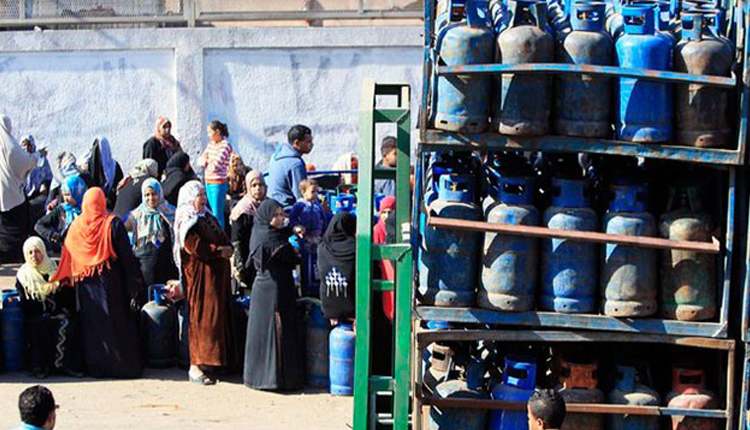Gas prices increase takes its toll on Egyptian households
A hike in the price of oil products on Saturday saw the butane gas canisters often used for cooking in Egypt rise in price to LE50 for residential use and LE100 for commercial use.
In March 2013, they sold for LE5 and LE8, respectively, thus seeing 1,000 per cent price hike over the past five years.
The government insists that the canisters remain subsidised for residential use by 71 per cent, or LE125, and for commercial use by 33 per cent, or LE49.4.
The canisters are sold for LE50 at government warehouses, though most people depend on private distributors who charge more for them. The exact price paid will depend on where the canisters are delivered and the policies of the distributor.
“Now I will have to pay at least LE100 per canister,” Manno Mahmoud, a new city resident, said. Distributors sell canisters to residents in her area at double the price charged at the warehouses, she said. “Fortunately, I can afford it, but I don’t know what poorer families will do,” she added.
“The private sector controls 64 per cent of around 3,000 or so warehouses selling cooking gas canisters,” Hossam Arafat, head of the Oil Products Division at the Federation of Egyptian Chambers of Commerce, said.
“The warehouses act as go-betweens between the government, which produces the canisters, and consumers, who obtain them through one or more middlemen, resulting in the higher prices of the canisters and the absence of fixed prices,” Arafat added.
Butagasco, the government gas supply company, controls 18 to 20 per cent of the distribution of the canisters through commercial outlets.
In the absence of piped natural gas, butane gas canisters are one of the main sources of energy used in homes across the country. Minister of Petroleum Tarek Al-Molla said last month that 8.6 million residential units were now connected to natural gas, and it is not known how many use the butane canisters.
President Abdel Fattah al-Sisi has ordered the building of natural gas pipelines to be speeded up to make life easier for residents particularly of the new cities, Presidential Spokesman Bassam Radi said last month.
Last week’s rise in the price of oil products is the third time these have increased in price since the government embarked on an economic reform programme and negotiated a $12 billion loan from the International Monetary Fund in November 2016.
In 2013, the government increased the price of gas canisters to LE8 for households and double that for commercial use. In 2016, the price increased to LE16 for households, almost doubling to LE30 in 2017.
The government allocated LE39 billion to subsidise the gas canisters in fiscal year 2017-18.
“Increasing the use of natural gas for domestic purposes will decrease the amount the government pays for subsidised butane canisters,” Arafat commented.
“About 80 per cent of Cairo governorate residents are connected to the natural gas network, whereas 60 per cent of the residents of Greater Cairo [the Giza, Cairo and Qalioubiya governorates] have discarded gas canisters after they joined the natural gas network,” he added.
“Controlling the market price depends on monitoring vendors,” he said.
Despite the fact that the natural gas network extends over most of the capital, Arafat said that there were “some 63,000 unlicensed coffee shops that use butane because they cannot be connected to the network unless they are properly documented. This is where the local authorities come in, which should tighten up on unlicensed premises.”
He expected shops using gas canisters to increase their prices.
After the announcement of the hike in prices, many shops selling fuul and felafel, Egyptian food staples, increased the prices on their menus.
One famous fuul and felafel shop in Cairo increased the price of its sandwiches by LE0.5 to reach LE3.5.
“Food prices shouldn’t increase by more than 15 to 20 per cent because this is the amount of fuel consumed in its production,” Arafat said.
However, the price rises for oil products will likely result in further increases in the prices of food and transportation, increasing the financial burden on food outlets. “Some shops may increase their prices by more than 15 to 20 per cent in a free market controlled by the laws of supply and demand,” he said.
“However, people should boycott traders guilty of price-gouging,” he added.
The Ministry of Petroleum has allocated LE89 billion to subsidising oil products in the 2018-19 budget, in comparison to LE110 billion in the current fiscal year.
Source: Ahram Online


